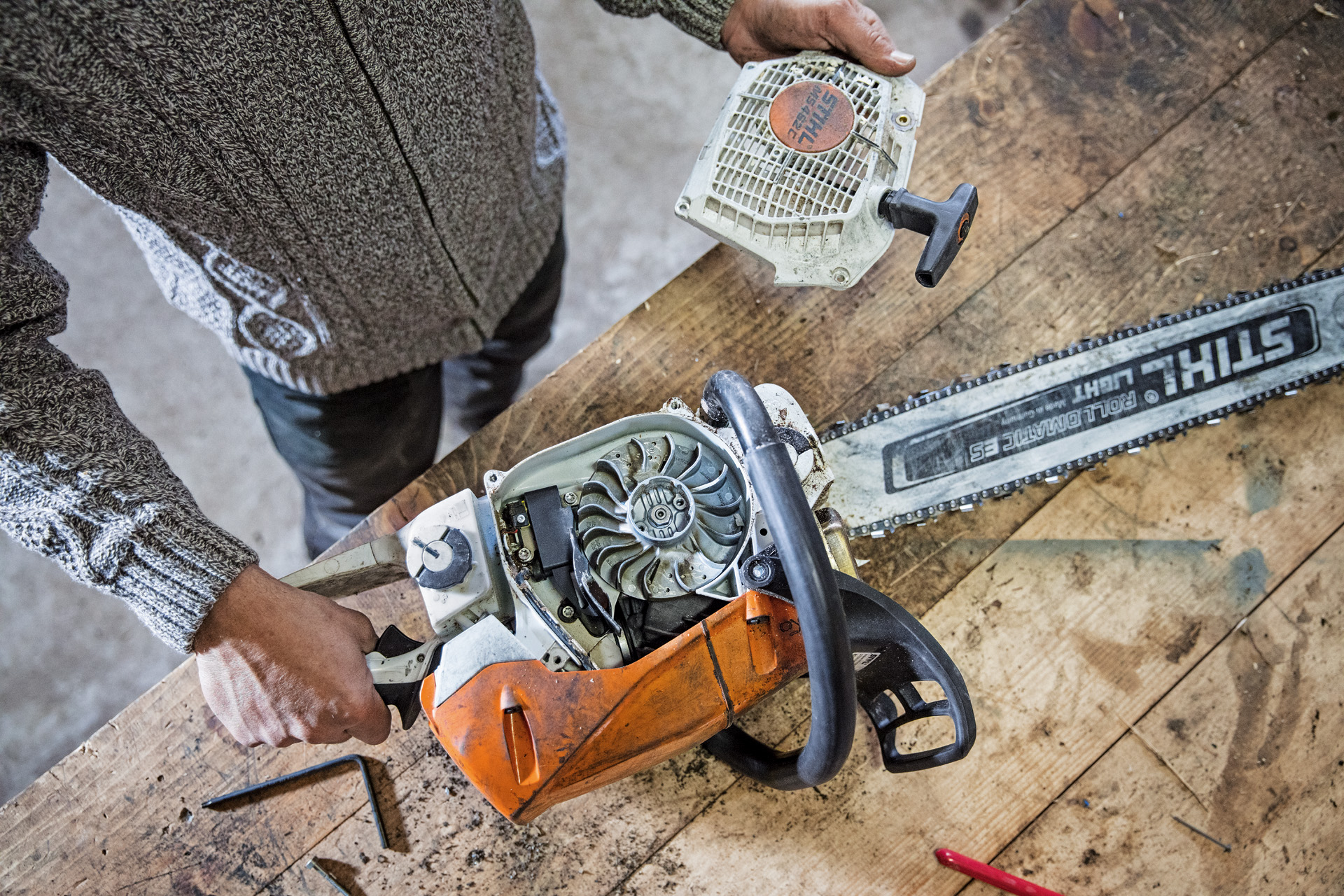The 2-stroke engine reimagined: STIHL 2-MIX engine technology
In search of performance that doesn’t unnecessarily harm your natural surroundings? Look no further than STIHL 2-MIX engine technology.
27.08.2024

The STIHL 2-MIX engine: efficiency reimagined
Are you looking for outstanding cutting performance or exceptional engine power? Either way, when you’re working in the forest or your garden you need a powerful engine you can rely on. The STIHL 2-MIX engine is the answer: a 2-stroke engine that brings together excellent engine performance, output and torque curves while keeping emissions to a minimum. It is a great environmentally friendly option, as confirmed by the fact that the 2-MIX engine meets the strict requirements of the Euro V emissions standard. So how does the STIHL 2-MIX engine manage to be both environmentally friendly and powerful at the same time? It’s all down to the efficient way it uses fuel. It uses an innovative stratified scavenging system that means fuel consumption and harmful emissions are reduced by up to 20% in comparison with conventional 2-stroke engines without 2-MIX technology.
How the STIHL 2-MIX engine works
The secret behind the faultless operation and efficient fuel consumption of the STIHL 2-MIX engine is in the reimagined cylinder dynamics that define the innovation. In a conventional 2-stroke engine, the position of the piston determines when the exhaust channel and overflow channels are opened or closed. In the STIHL 2-MIX engine we’ve optimised this process: immediately after ignition in the 2-MIX engine, a separating layer of gas forms between the burnt gases in the combustion chamber and the fresh mixture in the crankcase; overflow in the engine takes place fractions of a second later. The fresh mixture then reaches the cylinder with a very brief delay and scavenges the exhaust gases there. That’s not all: the small delay means that the piston in a 2-MIX engine has just the right amount of extra time to move up and seal the exhaust channel, ensuring that any unburned fresh mixture is kept away from the exhaust channel and can be combusted more efficiently. This is scavenged from the tool to a much lower extent than in a conventional 2-stroke engine – in other words, stratified scavenging in STIHL 2-MIX engines results in minimal scavenging losses. We’ve summarised all of the advantages of the system below.

The benefits of a STIHL 2-MIX engine compared to a standard 2-stroke engine
The separating layer of gas means that over 80% of the unburned fresh mixture is not released into the atmosphere with the STIHL 2-MIX engine. This is much kinder to both people and the environment, because the unburned fresh mixture contains fuel particles that can harm both users and nature, such as petrol and toluene. The 2-MIX engine also boasts outstanding performance and a lightweight design, bringing another advantage: less unburned petrol is unnecessarily released from the engine into the atmosphere, so you can get the most out of every tank of fuel. As a result, the fuel consumption of a 2-MIX engine is around 20% less than that of a comparable standard 2-stroke engine.
STIHL 2-MIX or 4-MIX® engine?
Both of our flagship engine systems are innovative, powerful and extremely efficient. We’ve summarised the key features of the two systems in the table below.
| STIHL 2-MIX engine | STIHL 4-MIX® engine |
|---|---|
| Efficient fuel consumption | The power available is applied as effectively as possible |
| Lower operating costs | Can be used anywhere |
| Efficient propulsion | Very high torque |
| Reduced pollution | Compact design |
Summary: STIHL 2-MIX engine
- Effective: excellent performance combined with efficient use of fuel
- Powerful: high torque over a wide range of speeds
- Environmentally friendly: fuel consumption is significantly reduced, which means less impact on the environment thanks to fewer harmful emissions
- Economical: fuel consumption is up to 20% lower compared to conventional 2-stroke engines without 2-MIX technology
- Future-proof: the STIHL 2-MIX engine with stratified scavenging fulfils the strict Euro V emissions standard





